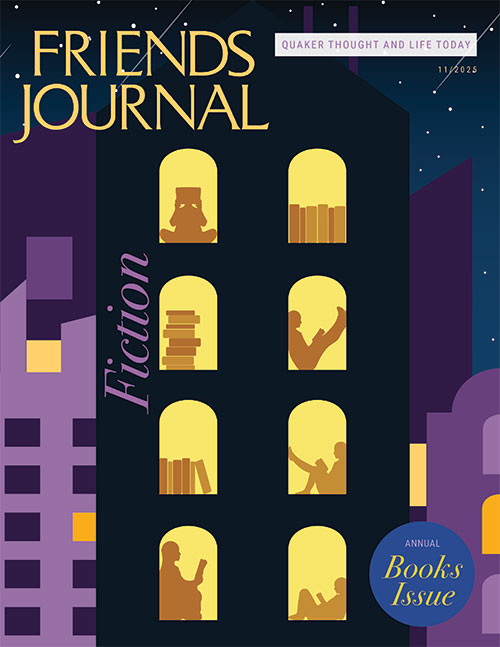The sun trumpeted morning to the sleeping stranger, but Mark Jacobs didn’t return the greeting. He just squeezed his eyes shut tighter. Mark was trying to ignore reality—his sore muscles, stiff back, and jackhammering, thought-fracturing headache. Groaning, he rolled over, reaching blindly for the protection of his comforter. Instead, he grabbed a prickly tuft of uprooted earth.
Mark bolted upright. “Where am I?” he asked the surrounding field.
Unsurprisingly, the field remained silent. It was the old black Chevy meandering down the lonely nearby highway that responded. The driver, an unassuming man in mute-colored clothing, stopped directly in front of Mark. “Can I help you, friend?”
Pride kept Mark from admitting he was lost. His work buddies were surely rolling over this. He didn’t need some stranger laughing at him too. “Car trouble,” Mark lied. “I need to borrow your phone.”
The man looked quizzically at him through the open window. “Sorry. I don’t have one.”
Mark raised an eyebrow at that but quickly dismissed his unasked questions. Better not to know. Truth was a dangerous thing—especially if it got personal.
The driver, however, seemed ignorant of this concept. “You’re not from around here, are you?” he proceeded, invitingly.
Mark gave an ambiguous shrug. He didn’t know where he was. For all Mark knew, he could be less than an hour from his apartment. Step out of the city, and you’re a stone’s throw from a country getaway . . . if you could pay. These days, the price of a New York minute was steep.
More silence.
The driver was now looking at him with such genuine, unjudgmental curiosity that it made Mark inwardly wriggle. His automatic response was to stare back evenly, intentionally—a look that told the world he would not be intimidated. Mark would never show weakness, never reveal his ignorance—especially to a stranger.
Mark felt he needed to say something but didn’t know how to respond. His tongue was rough and gritty sandpapered stillness. Thinking on his feet wasn’t usually so difficult. He had the anniversary of Ann’s death and last night’s bender to blame for that. Or maybe it was this place. Mark’s broken thoughts throbbed. He shifted uncomfortably; the only sound, wind rustling blades of grass.
The driver’s face was placid. He was at home with silence.
Mark was confused. He had expected impatience from the driver. But the man didn’t swear, start the engine, and roar away. He didn’t even make a sarcastic, passive-aggressive, cat-got-your-tongue remark to cut the awkwardness. Mark shivered. That goofy look of peace, he thought, gaping at the driver; that was the mask worn by every serial killer at the start of every horror flick ever.
“Hop in.” The man said, innocently. “I’ll give you a lift into town.” As if to reinforce the offer, he reached across the seat and opened the passenger door for Mark.
Peering inside, Mark checked for signs like missing door handles. Nope. Perfectly innocuous. Just like the man.
Mark frowned. This was all wrong somehow. Different. Different was never good. But then again, neither was dying out in the middle of nowhere. Mark glanced back at the silent field before turning back to the man. Mark concededly nodded his appreciation and got in the car.
Conversation on the drive was nonexistent. Mark didn’t have much to say . . . yet. But wait until he got that jerk Frank on the phone. This practical joke had to have been his idea. Frank had better apologize and come pick him up. Otherwise, someone’s new Ferrari was getting keyed. Mark wasn’t usually so vengeful, but he was pissed.
Wind from the open window whipped past his ears. All Mark could think about was Frank. And last night. About wanting to go home. And not wanting to. And, of course, his dead wife. Trees and fields continued zipping by as Mark listened to the tires on the pavement, both grateful for and disturbed by the driver’s lack of small talk.
After a while, they pulled off onto a gravel road, still no sign of civilization in sight. “We’re here,” the driver announced.
Mark was regretting this decision. “I thought we were going to town,” he said.
“The meetinghouse is the center of town,” the man answered.
The car turned a bend and a two-story, wood-frame house appeared. The building and grounds looked as meticulously tended as the man’s car. Nope, thought Mark, not a creepy red flag at all.
The man parked at the edge of the grass; got out; and bent over the flower bed, picking orange lilies.
Mark quietly opened the car door, ready to make a dash for it.
The man interrupted. “Hand me that vase in the back,” he directed.
Mark had had enough games. “What the hell is going on here?!” His voice was thunderous, and his face raged red—an emotional state that didn’t do his headache, or his blood pressure, any favors.
The man looked confused. However, his face didn’t question Mark. It pitied him. “There’s no need for fear, friend.”
“Friend?” Mark had never been this angry. “We don’t even know each other’s names.” His hands tightened into fists. “And scared? I’ll knock your frickin’ head off.”
Singing from the building cut Mark short from acting on his threat. Maybe someone inside had a phone, he thought, storming past the driver.
Inside was a large room filled with a peculiar assortment of people, about 40 total. They sat on long benches, which formed as much of a circle as straight lines can manage. A man sang a deep baritone. A trans man in a lime T-shirt sang off-key. An Asian woman in an antique dress rocked her sleeping baby.
Great, thought Mark, a den of psychos. Who else would be out here in the middle of nowhere, and singing, at this ungodly hour? Religious nuts. Mark shuddered. All their faces wore that same creepy expression of peace that the driver had earlier.

Almost as if he had been called, the driver entered with the vase of flowers. The bare table in the center of the room had been waiting. The man lovingly set down the lilies. He wondered what horrors Mark had experienced in his world that could make him act so. For what is anger but fear? He and Mark studied one another. Dropping his gaze, he turned and sat on the nearest bench, ushering Mark to do the same. Imagine, needing to know someone’s name to call them “friend.” Didn’t he know they were all just members of the same body? He shook his head.
Light shined through the plain glass windows on an indecisive Mark.
The smiling congregation sang encouragement. They knew those who discovered the highway couldn’t always accept this place for what it was. The chorus concluded. If the stranger chose not to stay, there would be others.
Awkwardness weighed heavily on Mark and pressed him to sit down. What else could he do? While everyone in the room sat perfectly still, Mark squirmed, waiting for the singing to continue or the service to start. But there was only silence.
The man who had been singing the deep baritone earlier, Jason Reynolds, watched Mark with amusement. He remembered back to 30 years ago when he sat there like Mark, impatient for answers. Jason watched as two of the elders finally shook hands, signaling the end of the meeting. The silent room flooded with happy communing voices. Jason knew Mark wouldn’t get answers during the shared noon meal. This nameless place couldn’t be explained, only experienced—understood over time.
There was scraping and shuffling as people worked together to get the benches pushed back. The driver, Harold Peabody, went over to a blond woman in a blue dress: his wife, Mary. He gave her a peck on the cheek. His twin girls, Sarah and Hannah, squinched up their faces. “Stop kissing, and help us get the tables,” they said. “We’re hungry.”
The afternoon sun glinted. But in this world, no matter the hour, it was still a clarion morning. Its smile beamed on all the bustling. But while the room had gone from still silence to a lively chatter, Mark had just sat there. He was obviously still bewildered, in pain and half-asleep.
Harold and Jason, having finished helping set up the tables, went over to join him. “Are you going to eat with us, friend?” asked Harold.
Mark stood up, buying time. He didn’t know what to say. A couple of playing children bumped into Mark and ran off giggling. What was it about this place, these people, that had him so off-balance? Mark eyed the tables, which were now laden with all manner of tempting home-cooked dishes. Mark was hungry. Still, he hesitated.
“Join us,” Jason encouraged; “it’s not poison.”
Mark’s mouth fell open. Was that an admission? His face screamed concern.
The others began tucking into the food. Jason laughed, along with the twinkling sun. “What do you think this is,” he asked, “a horror story?”





Comments on Friendsjournal.org may be used in the Forum of the print magazine and may be edited for length and clarity.